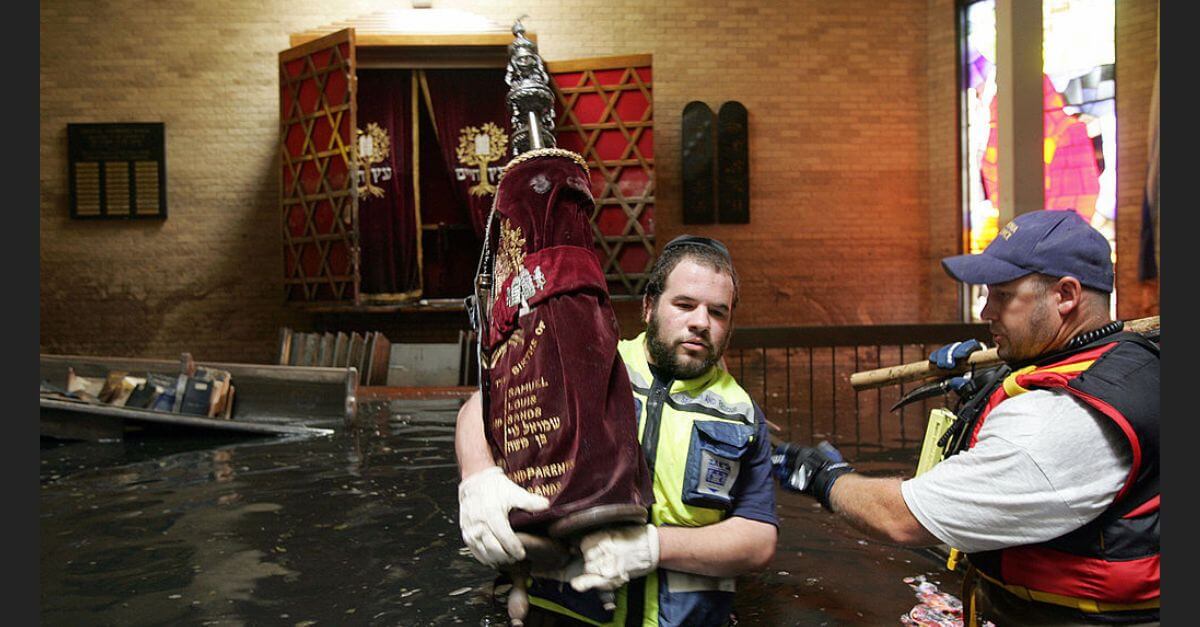20 years after Katrina, Jewish New Orleans is bigger than it was before the hurricane
An influx of young Jews and support from communal institutions has helped revive the Jewish community

Rabbi Isaac Leider from the Jewish Zaka volunteers carries a Torah scroll out of the flooded synagogue of Beth Israel in New Orleans in September 2005. Photo by Menahem Kahana/AFP via Getty Images
Two decades ago, Hurricane Katrina devastated New Orleans. The storm killed almost 1,400 people and caused an estimated $125 billion in damage. Damage to Jewish communal institutions totaled $20 million, including the near-total destruction of Congregation Beth Israel and its seven Torah scrolls. An estimated 80% of Jewish residents’ homes were damaged. Within six months, the area lost about 3,500 Jews — more than a third of its Jewish population.
Today, Jewish life in New Orleans is thriving. Between 12,000 and 13,000 Jews live in New Orleans, up from around 9,500 before Katrina. The area is home to seven synagogues and two Chabad centers — matching pre-Katrina numbers, according to Sherri Tarr, COO of the Jewish Federation of Greater New Orleans. Congregation Beth Israel has a new building.
“There are people who are still moving back, who moved away after Katrina,” Tarr said. “It’s a wonderful place to be Jewish.”
The resurgence comes despite the fact that New Orleans as a whole has yet to return to its pre-Katrina population size. Tarr attributed the revival in part to support provided by Jewish institutions and an influx of young Jews who moved to the area in Katrina’s wake, driven by a desire to aid in recovery.
In the immediate aftermath of the storm, United Jewish Communities (now Jewish Federations of North America) stepped in with fast, direct support — offering $700 in cash to every Jewish adult affected, no questions asked. Globally, the American Jewish community mobilized, raising $28 million for relief efforts. In 2007, the Jewish Federation of Greater New Orleans launched an incentive program for Jewish newcomers, offering a stipend for moving expenses, discounted tuition at the Jewish Community Day School, and a year of free membership at a synagogue. According to Tarr, hundreds of people participated in the program, which ran through 2012, and 25% have stayed.
“What they did for our community was unbelievable, which was they enabled us to remain afloat for two years while we were able to rehabilitate ourselves,” said Rabbi Mendel Rivkin, who works at the Chabad-Lubavitch of Louisiana. “And that’s something that I’ll never forget: the generosity of the American Jewish community.”
Rivkin stayed in New Orleans the night Hurricane Katrina made landfall, driven by a sense of duty to help those left behind. That night, he felt his house shaking, and his chimney cap crashed down onto his car. As news of the levees’ failures began to circulate, it became clear they needed to leave. He and his family evacuated to Houston, where they would remain for the next three months.
“When we left New Orleans, we didn’t know if there would be a New Orleans to return to,” he said.
During that time, he made frequent trips back to the city. Chabad played an active role in relief efforts — helping people locate missing loved ones and accompanying a search and rescue team that saved 50 people.
Looking back, Rivkin believes Hurricane Katrina united the Jewish community and made it more resilient.
“I would say that the Jewish community specifically has fully recovered,” he said.
In the years that followed, New Orleans even gained additional Jewish institutions, including the Museum of the Southern Jewish Experience, which opened in 2021, as well as Avodah Jewish Service Corps and Moishe House, which both provide communal Jewish housing for young adults.
Gill Benedek, who now works as a lawyer in New York City, was part of the first Moishe House in New Orleans that opened post-Katrina in 2006. He spent four years in New Orleans shortly after graduating college, drawn to the area specifically to help with hurricane relief — and hosting Shabbat potlucks with Moishe House on the side.
“There was a very vibrant, growing younger Jewish scene,” he said, “both people that may have been from New Orleans and came back, and then also people that were moving to New Orleans.”
Tarr was one of many who left her home and came back. During the storm, she and her family evacuated to Houston, where they temporarily built a new life.
“It’s still very triggering,” she said. “It was very hard for those 10 months that we weren’t here. Houston was wonderful, but it wasn’t New Orleans.”
She returned determined to rebuild, even as her own family leaned on the very institutions she was helping to fundraise for at the Federation. The Jewish community had covered her children’s tuition at a Jewish day school in Houston, and her parents’ neighbors dropped off an envelope with $1,600 in cash after hearing how Katrina had affected the family — a moment Tarr recalled through tears.
“I was raising money to distribute to people in need,” she said. “During Katrina, we were the ones in need.”
This Shabbat, Tarr will attend a local synagogue’s commemorative service in honor of the 20th anniversary of Katrina. But the rest of the week, she’ll return to other Federation responsibilities — thankful that Katrina recovery efforts no longer demand the focus they once did.















